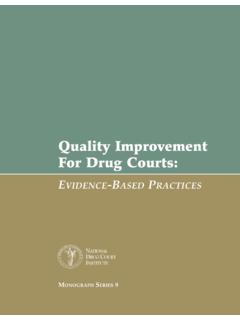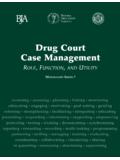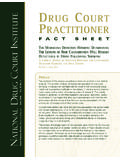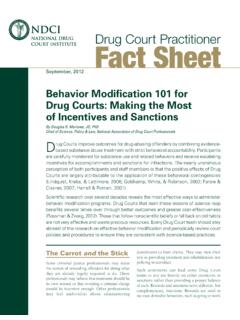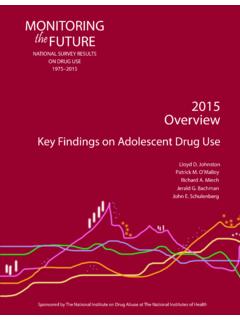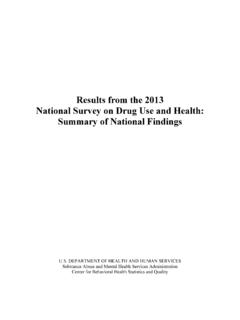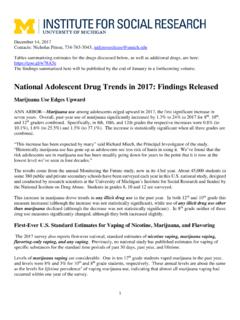Transcription of Quality Improvement For Drug Courts - National …
1 Quality ImprovementFor drug Courts :EVIDENCE-BASEDPRACTICESMONOGRAPHS ERIES9 NATIONALDRUGCOURTINSTITUTE Quality Improvement for drug Courts : Evidence-Based Practices Editors: Carolyn Hardin, Jeffrey N. Kushner, April 2008 Quality Improvement for drug Courts : Evidence-Based Practices Prepared by the National drug court institute , the education, research , and scholarship affiliate of the National Association of drug court Professionals. Copyright 2008, National drug court institute National drug court institute C. West Huddleston, III, Executive Director Carolyn Hardin, Director 4900 Seminary Road, Suite 320 Alexandria, VA 22311 Tel. (703) 575-9400 Fax. (703) 575-9402 This project was supported by Cooperative Agreement Number 2007-DC-BX-K001 awarded by the Bureau of Justice Assistance with the support of the Office of National drug Control Policy, Executive Office of the President.
2 The Bureau of Justice Assistance is a component of the Office of Justice Programs, which also includes the Bureau of Justice Statistics, the National institute of Justice, the Office of Juvenile Justice and Delinquency Prevention, and the Office for Victims of Crime. Points of view or opinions in this document are those of the authors and do not represent the official position or policies of the Department of Justice or the Executive Office of the President. All rights reserved. No part of this publication may be reproduced, stored in a retrieval system, or transmitted, in any form or by any means, electronic, mechanical, photocopying, recording or otherwise, without the prior written permission of the National drug court institute . Printed in the United States of America.
3 drug Courts perform their duties without manifestation, by word or conduct, of bias or prejudice, including, but not limited to, bias or prejudice based upon race, gender, National origin, disability, age, sexual orientation, language, or socioeconomic status. Quality Improvement for drug Courts : Monograph Series 9 National drug court institute ii ACKNOWLEDGEMENTS The National drug court institute (NDCI) is grateful to the Office of National drug Control Policy of the Executive Office of the President and the Office of Justice Programs, Bureau of Justice Assistance at the Department of Justice for the support that made this publication possible. NDCI owes its sincere gratitude to the researchers who agreed to develop the individual chapters knowing full well that there would be no financial remuneration for them.
4 It took no convincing on our part for them to agree to work with us on the document. Without question they are all proud of the research they are doing and eager to share it for the benefit of drug Courts and our participants. The researchers involved were dedicated to the project and earnestly wanted a product that they could be proud of that would be useable by drug Courts across the country. Our work group critiqued each others chapters and as a result, changes were made and an improved document resulted. They are: Adam C. Brooks, , Treatment research institute Deni Carise, , Treatment research institute Patrick M. Flynn, , Texas Christian University Christine Grella, , UCLA Integrated Substance Abuse Programs James A. Hall, , University of Iowa Kathryn A.
5 Kelly, University of Washington Kevin Knight, , Texas Christian University G. Alan Marlatt, , University of Washington Douglas B. Marlowe, , , Treatment research institute Thomas McLellan, , Treatment research institute Charles O Brien, , , University of Pennsylvania Andrew Osborne, National Development & research Institutes, Inc. George A. Parks, , University of Washington Roger H. Peters, , University of South Florida Amanda R. Reedy, University of Iowa Charles R. Schuster, , Loyola University D. Dwayne Simpson, , Texas Christian University Maxine L. Stitzer, , Johns Hopkins Medicine Julie K. Williams, , University of Iowa This publication could not have come to fruition without the valuable contributions, oversight, and editorial work of the following individuals: Chet Bell, Stewart-Marchman Center Alec Christoff, National drug court institute C.
6 West Huddleston, III, National Association of drug court Professionals / National drug court institute T. Ron Jackson, University of Washington The Honorable Louis J. Prezenza, Philadelphia Municipal court Quality Improvement for drug Courts : Monograph Series 9 National drug court institute iii Quality Improvement for drug Courts : Monograph Series 9 National drug court institute iv TABLE OF CONTENTS INTRODUCTION 1 CHAPTER 1: drug court SCREENING Knight, Flynn, & Simpson 3 CHAPTER 2: EVALUATING TH E EFFECTIVENESS OF ADDICTION TREATMENT McLellan 13 CHAPTER 3: RELAPSE PREVENTION THERAPY WITH SUBSTANCE ABUSING OFFENDERS Marlatt, Parks, & Kelly 23 CHAPTER 4: MEDICATION-ASSISTED TREATMENT FOR PARTICIPANTS IN drug court PROGRAMS Schuster & O Brien 33 CHAPTER 5.
7 CULTURAL COMPETENCY IN drug court Osborne 43 CHAPTER 6: CO-OCCURING DISORDERS Peters 51 CHAPTER 7: GENDER RESPONSIVE drug TREATMENT SERVICES FOR WOMEN Grella 63 CHAPTER 8: CASE MANAGEMENT AND drug Courts Hall, Williams, & Reedy 75 CHAPTER 9: LINKING drug court PARTICIPANTS TO NEEDED SERVICES Carise & Brooks 87 CHAPTER 10: MOTIVATIONAL INCENTIVES IN drug court Stitzer 97 CHAPTER 11: APPLICATION OF SANCTIONS Marlowe 107 APPENDIX: CHECKLIST FOR DESIGNING PROBLEM-SOLVING Courts TO ADDRESS CO-OCCURING DISORDERS 115 Quality Improvement for drug Courts : Monograph Series 9 National drug court institute vQuality Improvement for drug Courts : Monograph Series 9 National drug court institute vi INTRODUCTION Currently million Americans abuse or are dependent on alcohol and/or illicit drugs (SAMHSA, 2007).
8 In 2005, more than 20,000 clean, sober, and law-abiding participants graduated from drug Courts across the country (Huddleston, Marlowe, & Casebolt, 2008). In the grand scheme of things, and given the total number of people in the criminal justice system with a drug abuse problem, the need to bring drug Courts to scale is of great importance. The research is clear that drug court graduates reoffend considerably less than others in and out of the criminal justice system who have drug problems (Belenko, 2001; Government Accountability Office, 2005). Given all the research and the associated literature reviews on drug Courts , there can be little doubt that drug Courts are effective, but can they be more effective? The answer will always be yes, as we continue to innovate and learn more about what works and what does not.
9 As we bring drug Courts to scale in terms of capacity and geography, are we also bringing drug Courts to scale in terms of Quality ? Are we using all the research that is currently available to keep people in the drug court process and improve our graduation rates? Probably not. That is why the National drug court institute and a cadre of the world s best researchers developed Quality Improvement for drug Courts : Evidence-Based Practices. We are now approaching 3,000 drug Courts and other problem-solving Courts in the United States. Some state Supreme Courts or Administrative Offices of the Courts have gone to their legislatures with budget recommendations that provide for a drug court in every judicial district in the states.
10 The literature supports this level of effort. The Ten Key Components are the guidelines for the drug court movement. The drug court community is indebted to the group that developed that document for the direction and standard it set for us. However, for many drug Courts in the country, it is time to ensure fidelity to the model by ensuring that evidence-based practices are implemented. This monograph will serve as the catalyst for teams to insist upon a higher standard of drug court operations. Each chapter of this monograph provides research that can guide drug Courts in their efforts to increase retention and graduation rates of participants that agree to go through the drug court process. Our hope is that a drug court that implements evidence-based practices like those recommended in this monograph could increase its graduation rate by as much as 10%.

